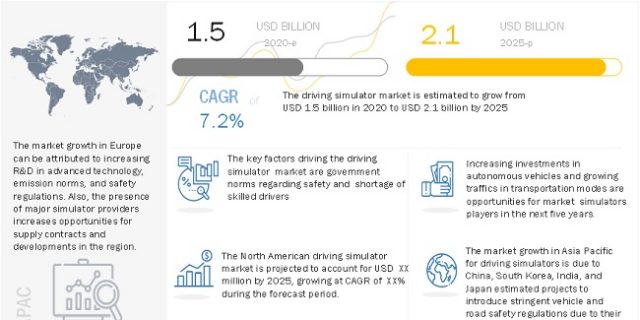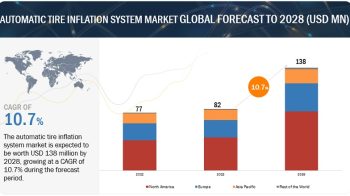
The global Driving Simulator Market is projected to grow at a CAGR of 7.2% from USD 1.5 billion in 2020 to USD 2.1 billion by 2025. The base year for the report is 2019, and the forecast period is from 2020 to 2025. Factors such as substantial production vehicles, increasing demand for trained pilots, significant investments in autonomous vehicles, and growing norms for road safety to drive the driving simulator market during the forecast.
In the driving simulator market, by simulator type, the advanced driving simulator segment is expected to capture the largest market share during the forecast period. This can be attributed due to its technologies, such as 360º viewing angle and motion platform, for a realistic experience. Since testing of technologically updated vehicle dynamics requires an augmented environment for analysis and research, advanced driving simulators help in developing intelligent highway designs and human behavior studies.
Download PDF Brochure @ https://www.marketsandmarkets.com/pdfdownloadNew.asp?id=171814690
Europe presents a significant growth opportunity for driving simulator as it is expected to be the largest market during the forecast period. The region it is home to many leading automobile companies, such as BMW (Germany), Daimler AG (Germany), and Volkswagen Group (Germany), and top simulator companies like ECA Group, Cruden B.V, VI-grade, and IPG Automotive. The automotive industry is one of the key contributors to Europe’s economy, which acts as an opportunity for the driving simulator market for training and testing purposes of vehicles.
North America is estimated to be the second largest driving simulator market during the forecast period. The driving simulator market is forecasted to be the most lucrative in North America due to the technological advancements in simulation and analysis technology for autonomous vehicles in the US. The US is the largest driving simulator market in North America, followed by Canada and Mexico.
In the driving simulator market, by application, the research & testing segment is projected to lead market during the forecast period. The research & testing simulators are mostly installed in research centers by various OEMs. Research & driving training simulators have several areas of application, including traffic safety, vehicle and roadway design, driver distraction, human interface design, driver assistance and information systems, and a variety of psychology, human factors, and health sciences topics. Simulation systems and tools are used in a wide range of commercial, academic, and drive testing applications. The testing of vehicles can be conducted as these simulators can simulate different road conditions without having to travel a great distance. Research simulators prove to be a significant tool as they enable testing of systems and components in the early development phase and provide instant and accurate data.
Request Free Sample Report @ https://www.marketsandmarkets.com/requestsampleNew.asp?id=171814690
COVID-19 Impact On Driving Simulator Market:
COVID-19 has halted production, plunged sales, and forced key players in various industries to buckle up and rethink plans. Rescheduling the launch of models and projects, stabilizing dealer networks, tightly managing cash flow, and reviewing investment portfolios have affected the production and sales of vehicles, trains, wagons, and others across the globe, resulting in a dip in the driving simulator market for professional training in 2020 as compared to 2019. Developments and installation of various professional training simulators in industries, such as automotive & transportation, logistics, and aerospace & defense, are also expected to slow down because of the pandemic. Major countries with a large market share are negatively impacted by the pandemic, subsequently reducing the installation of driving simulators.
The demand for training and testing simulators depends on adoption of technologies in commercial vehicles, rails, airports; stringent safety regulations; encouragement by governments to install training simulators in driving schools; and released jobs for skilled drivers. The impact of the COVID-19 pandemic on industries like automotive, aviation, and railways is expected to affect the global driving simulators market as well. Driving simulators market for professional training are backed by players like ECA Group, Cruden B.V, Corys, Transurb, Tecknotrove, SHRail, and Cassidian. These companies have also been undergoing production halts during lockdowns. For instance, in the context of the COVID-19 crisis, the ECA Group limited its manufacturing activities within its sites to preserve the health and safety of its employees. The company has undertaken the remote work policy for multiple projects to further maintain its revenue in the coming days.
Speak to Analyst @ https://www.marketsandmarkets.com/speaktoanalystNew.asp?id=171814690


